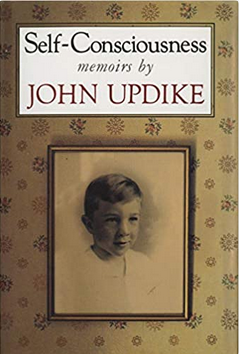On September 18, 2022, Flashbak (Everything Old Is New Again) posted “John Updike On Death, Writing And the Last Words,” in which Paul Sorene gave some thought to Updike’s memoir and the relationship between the author’s preoccupations with writing and death.
“Memory is like the wishing-skin in fairy tales, with its limited number of wishes,” Updike wrote, prompting Sorene to wonder, “Can writing preserve memories and keep death at bay? Who gets to tell Updike’s story after he’s gone, and how will he be remembered?”
Sorene, quoting liberally from Self-Consciousness, noted that “Updike saved almost everything. His papers, stored at Harvard, include his golf scorecards [the John Updike Childhood Home has several of these on display], legal and business records [the JUCH also has his travel log, many of his cancelled checks, and a number of business correspondences with publishers], fan mail, video tapes, photographs, drawings [plenty of those on display at JUCH], and rejection letters. Was saving and preserving the past done so we could remember him, and he could better remember himself, and try again?”
That interesting question prompts another: What is the relationship between the collecting impulse, the writing impulse, and the impulse to somehow live forever?

